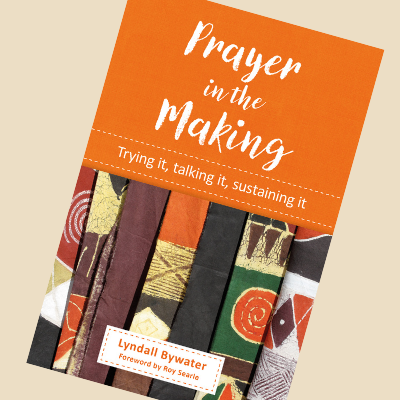In this new series of weekly articles on prayer, Martyn Payne, BRF’s prayer advocate, explores why prayer is at the heart of the Christian faith.
To be a Christian without prayer is no more possible than to be alive without breathing.
Martin Luther
Earlier this year, during the lockdown, prayer became headline news. Record numbers of people searched ‘prayer’ on the internet. Surveys reported that one in four of us were tuning in to church services online, where we were invited to join with others in prayer.
It seems that an instinct to pray does not lie far below the surface, even in our increasingly secular western culture. Deep down human beings believe in prayer.
‘Deep down human beings believe in prayer.’
This year’s experience of the global pandemic has highlighted the fragility of life. For many, this has disturbed them into a desire to try to talk with someone or something higher than themselves.
Human beings are by nature, it seems, hardwired to search for meaning. Faced with a situation over which we have no control, and on hearing stories of suffering and death such as we have recently, it is not surprising that our cries for help and hope have found expression in prayer.
People like prayer
In the west, prayer may well have been rebranded as mindfulness, meditation or an aspect of lifestyle spirituality. Nevertheless, it remains at its root a desire to connect with something that can help explain who and why we are.
No doubt, moments of global or personal trauma heighten this desire. Interestingly, news bulletins still routinely report that ‘prayers were said’. But prayer isn’t just explainable as a crisis phenomenon.
Prayer is one of the few ‘religious words’ to survive into the general vocabulary of people everywhere, whether or not they believe in a god. Teams from churches regularly report a very positive response when prayer is offered on the streets or at a festival prayer tent. We all want prayer to be ‘true’, however we understand it, and of course we want prayers to be answered.
But let’s be honest: isn’t prayer really nothing more than wishful thinking or, worse, a self-deceiving comfort blanket – a sort of psychic crutch?
Is it real?
For Christians, prayer is at the heart of their faith. Yet even for those who believe in prayer, it remains a mystery. How is it that God can hear all the prayers of all the people in all the world and promise to answer them? And why do we pray when God clearly, by definition, already knows what we will be asking for and understands what is best for us better than we do?
‘Prayer isn’t a simple transaction of asking and receiving.’
Most Christians soon discover on their faith pilgrimage that prayer isn’t a simple transaction of asking and receiving – at least not in the sense most of us hope for. Prayers aren’t answered when and how we want. Prayer is a much more mysterious activity than that.
There is a fascinating short poem attributed to C.S. Lewis in which he tackles this issue. The opening lines cut to the heart of the problem:
Master, they say that when I seem
To be in speech with you,
Since you make no replies, it’s all a dream
One talker aping two.
In other words, is prayer no more than a comforting way of talking to ourselves? And aren’t Christians, along with all those of faith, merely deluding themselves that there is a god who cares and who is listening?
For some, prayer may well amount to no more than this. But this is not how Christians understand prayer, as the poem goes on to explore.
Conversing with the Godhead
Throughout the period of lockdown, and now in this next phase of the coronavirus, BRF has been posting daily prayers on social media: prayers that offer thoughtful and well-crafted words for supporters, to help them connect with God.
These have been appreciated and shared widely. They have given voice, as Christians believe, to our God-given instinct to join in the conversation within the Godhead that is always happening beyond our natural hearing.
Maybe it is a happy coincidence that in the English language the word ‘prayer’ rhymes with ‘air’. Just as oxygen around us is vital for physical life, so prayer is essential for our spiritual health. Christians believe that prayer is part of our life-support system.
‘Prayer is part of our life-support system.’
God-breathed prayer
The poem goes on to answer detractors by agreeing that we may well be mostly ‘talking to ourselves’, but in fact what seem to be just our own words – words which are so often clumsy and inadequate – are really God’s words through us, God speaking for us:
Then, seeing me empty, you forsake
The listener’s role, and through
My dead lips breathe and into utterance wake
The thoughts I never knew.
Prayer is more mysterious than we realise. The truth being that whatever words we eventually do use in prayer actually come from God in the first place. God is enabling us to join with heaven in that continuous dialogue of prayer that sustains all that was, and is, and is to come.
The writer of the book of Revelation gives us a glimpse of this when he describes ‘the prayers of the saints rising like incense’ in heaven. This in turn recalls the altar of incense that Moses commanded to be set up in the tabernacle before the holy of holies, where continuous prayer was to be offered day and night.
‘Prayer is God’s Spirit at work in our words.’
God’s best answer to our prayers is God’s partnership in our praying. Prayers may seem to be our own extempore words or words borrowed from others… in reality it is God’s Spirit at work in both. Herein lies the mystery of prayer.
Join us in exploring prayer!
It is debatable whether the instinct to pray that was reawakened during the worst of our lockdown months will continue to be kindled. So, surely, this is something that we as churches need to address in order to help people go on exploring prayer, as part of their spiritual journey?
To do just that, over the next eight weeks, BRF will be offering a series of articles on prayer. These will look at how we might develop rhythms for our praying, explore creativity in prayer, pray as households and find the prayer habits that can be most helpful.
We’ll also look at some of the Christian traditions of prayer that have sustained believers down the ages, and what it means to gather with others to pray.
We hope you will join us on this prayer journey, and make use of the prayers we offer on social media and in the BRF Prayer Diary.
Prayer is as vital as breathing for our health and wholeness. Prayer is the mystery we dare not live without. Perhaps it took Covid-19 to remind us all of that.

Martyn Payne was a BRF staff member and part of the Messy Church team until his retirement in 2018. Martyn is now a volunteer and writes the BRF prayer diary and is involved in Messy Church.
Pray with us
Would you like to pray with us for our work and ministries?
Every week – please sign up for a weekly prayer email from Richard Fisher, BRF’s chief executive
Three times a year – you can download our seasonal prayer diary.

Prayer in the Making
Trying it, talking it, sustaining it
Do you find regular prayer time a struggle? Let Lyndall Bywater help you find which type of prayer best suits you and your lifestyle so you can create, sustain and enjoy a habit of conversing with God.
